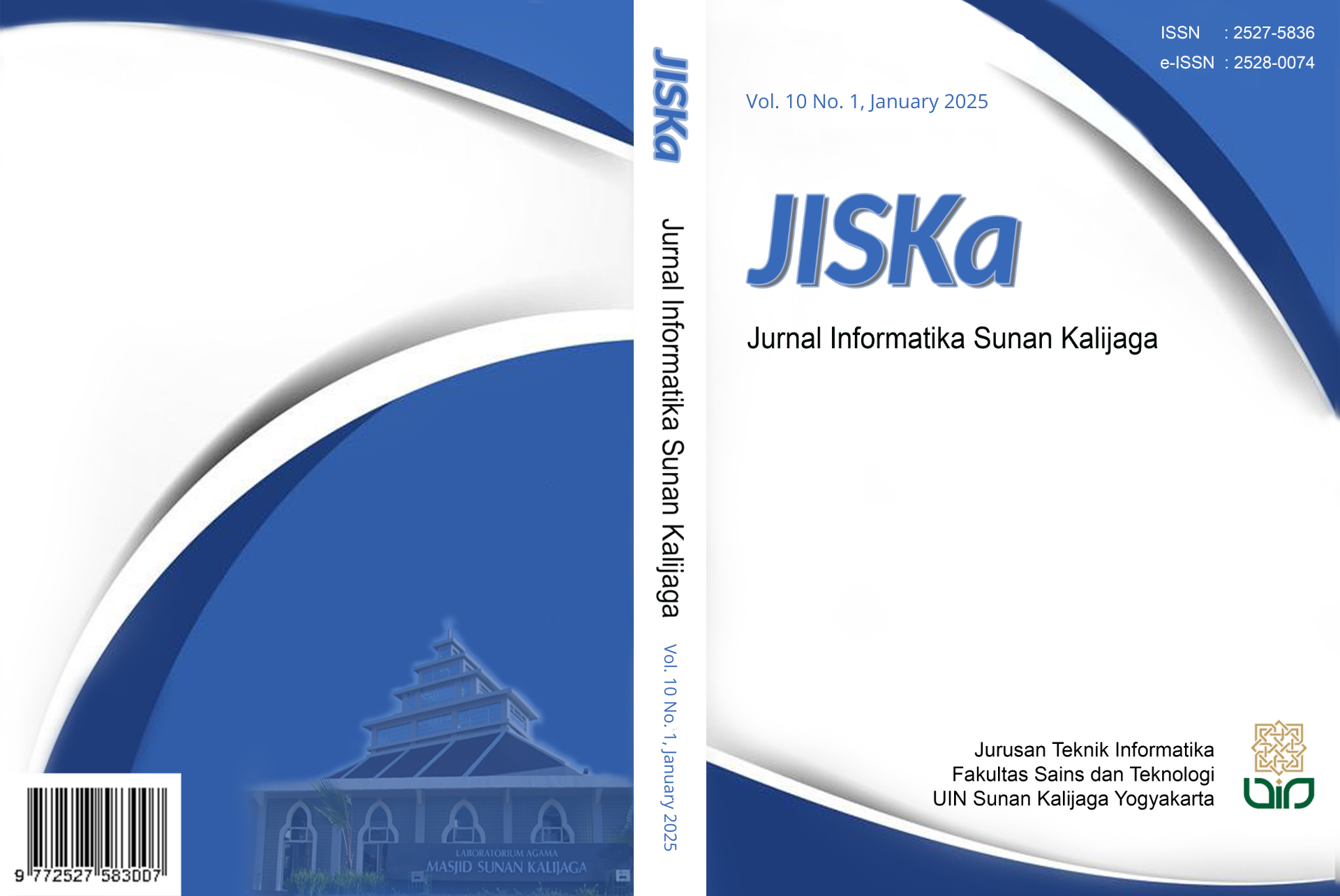Predicting Olympic Medal Trends for Southeast Asian Countries Using the Facebook Prophet Model
DOI:
https://doi.org/10.14421/jiska.2025.10.1.16-32Keywords:
Custom Seasonality, Facebook-Prophet, Forecasting, Olympic Medals, Time SeriesAbstract
The Olympics are a world-class sporting event held every four years, serving as a meeting place for all athletes worldwide. The Olympics are held alternately in different countries. The Olympics were first held in Athens in 1896 and have now reached the 33rd Olympics, which will be held in Paris in 2024. Significant work has been conducted to develop prediction models, with a primary focus on enhancing the accuracy of predicting Olympic outcomes. However, low-performance regression algorithms are the main problem with prediction. By integrating custom seasonality with the Facebook Prophet prediction model, this study aims to enhance the accuracy of Olympic predictions. The proposed new model involves several steps, including preparing the data and initializing and fitting the Facebook-Prophet model with several parameters such as seasonal mode, annual seasonality, and prior scale. The model is tested using the Olympic dataset (1994–2024). The evaluation results indicate that this prediction model provides a reliable estimate of the total medals earned. On the Olympic Games (1994-2024) dataset, the model exhibits a very low error, as indicated by its MAE, MSE, and RMSE, and achieves an R² score of 0.99, which is close to perfect. This research shows that the model is effective in improving prediction accuracy.
References
Agyemang, E. F., Mensah, J. A., Ocran, E., Opoku, E., & Nortey, E. N. N. (2023). Time Series Based Road Traffic Accidents Forecasting via SARIMA and Facebook Prophet Model with Potential Changepoints. Heliyon, 9(12), e22544. https://doi.org/10.1016/j.heliyon.2023.e22544
Angelo, M. D., Fadhiilrahman, I., & Purnama, Y. (2023). Comparative Analysis of ARIMA and Prophet Algorithms in Bitcoin Price Forecasting. Procedia Computer Science, 227, 490–499. https://doi.org/10.1016/j.procs.2023.10.550
Annapoorna, E., Sujil, S. V, S, S., Abhishek, S., & T, A. (2024). Revolutionizing Stock Price Prediction with Automated Facebook Prophet Analysis. 2024 International Conference on Inventive Computation Technologies (ICICT), 1307–1314. https://doi.org/10.1109/ICICT60155.2024.10544766
Asha, V., Sreeja, S. P., Saju, B., C S, N., N, P. G., & Prasad, A. (2023). Performance Analysis of Olympic Games Using Data Analytics. 2023 Second International Conference on Electronics and Renewable Systems (ICEARS), 1436–1443. https://doi.org/10.1109/ICEARS56392.2023.10084943
Badoni, P., Choudhary, P., Rudesh, C. P., & Singh, N. T. (2023). Predicting Medal Counts in Olympics Using Machine Learning Algorithms: A Comparative Analysis. 2023 International Conference on Advanced Computing & Communication Technologies (ICACCTech), 116–121. https://doi.org/10.1109/ICACCTech61146.2023.00027
Cheng, J., Tiwari, S., Khaled, D., Mahendru, M., & Shahzad, U. (2024). Forecasting Bitcoin Prices Using Artificial Intelligence: Combination of ML, SARIMA, and Facebook Prophet Models. Technological Forecasting and Social Change, 198, 122938. https://doi.org/10.1016/j.techfore.2023.122938
Chowdary, P. H., Kaur, V., Nandeesh, T., Krishan, K., & Kaur, A. (2024). From Athens to Rio: A Comprehensive Data Analysis and Visualization of 120 Years of Olympic History. 2024 11th International Conference on Reliability, Infocom Technologies and Optimization (Trends and Future Directions) (ICRITO), 1–6. https://doi.org/10.1109/ICRITO61523.2024.10522373
Ding, S., Ye, J., & Cai, Z. (2024). Multi-Step Carbon Emissions Forecasting Using an Interpretable Framework of New Data Preprocessing Techniques and Improved Grey Multivariable Convolution Model. Technological Forecasting and Social Change, 208, 123720. https://doi.org/10.1016/j.techfore.2024.123720
Dong, X., Guo, W., Zhou, C., Luo, Y., Tian, Z., Zhang, L., Wu, X., & Liu, B. (2024). Hybrid Model for Robust and Accurate Forecasting Building Electricity Demand Combining Physical and Data-Driven Methods. Energy, 311, 133309. https://doi.org/10.1016/j.energy.2024.133309
Gautam, V., Yadav, V., & Kumar, S. (2023). Diagnosis and Forecast of Murder Rates in India Using Random Forest and Prophet Algorithm. 2023 International Conference on Computational Intelligence, Communication Technology and Networking (CICTN), 173–177. https://doi.org/10.1109/CICTN57981.2023.10141293
Gong, F., Han, N., Li, D., & Tian, S. (2020). Trend Analysis of Building Power Consumption Based on Prophet Algorithm. 2020 Asia Energy and Electrical Engineering Symposium (AEEES), 1002–1006. https://doi.org/10.1109/AEEES48850.2020.9121548
Guo, L., Fang, W., Zhao, Q., & Wang, X. (2021). The Hybrid PROPHET-SVR Approach for Forecasting Product Time Series Demand with Seasonality. Computers & Industrial Engineering, 161, 107598. https://doi.org/10.1016/j.cie.2021.107598
Herzog, W. (2024). The Paris 2024 Olympic and Paralympic Games. Journal of Sport and Health Science, 13(6), 717–718. https://doi.org/10.1016/j.jshs.2024.06.003
Ismail, Y. (2024). Olympic Games (1994-2024). https://www.kaggle.com/datasets/youssefismail20/olympic-games-1994-2024
James, M. (2023). Human Rights and the Olympic Charter. The International Sports Law Journal, 23(3), 267–270. https://doi.org/10.1007/s40318-023-00254-5
Jia, K., Zhu, Y., Zhang, Y., Liu, F., & Qi, J. (2022). International Public Opinion Analysis of Four Olympic Games: From 2008 to 2022. Journal of Safety Science and Resilience, 3(3), 252–262. https://doi.org/10.1016/j.jnlssr.2022.03.002
Karunasingha, D. S. K. (2022). Root Mean Square Error or Mean Absolute Error? Use Their Ratio as Well. Information Sciences, 585, 609–629. https://doi.org/10.1016/j.ins.2021.11.036
Lei, Y., Lin, A., & Cao, J. (2024). Rhythms of Victory: Predicting Professional Tennis Matches Using Machine Learning. IEEE Access, 12, 113608–113617. https://doi.org/10.1109/ACCESS.2024.3444031
Li, Y., Liu, J., Ang, S., & Yang, F. (2021). Performance Evaluation of Two-Stage Network Structures with Fixed-Sum Outputs: An Application to the 2018 Winter Olympic Games. Omega, 102, 102342. https://doi.org/10.1016/j.omega.2020.102342
Mahajan, A. S., & Shrivastav, A. (2023). Short Term Load Forecasting Based on Regression Models. 2023 International Conference for Advancement in Technology (ICONAT), 1–8. https://doi.org/10.1109/ICONAT57137.2023.10080359
Mousa, M. A., AlMansoori, A. N., & AlAjami, F. A. (2023). A Hybrid PV Power Forecasting Model Implementing Emerging Machine Learning Algorithms: Prophet and Neural Prophet. 2023 Middle East and North Africa Solar Conference (MENA-SC), 1–8. https://doi.org/10.1109/MENA-SC54044.2023.10374512
Phan, Q.-T., Wu, Y.-K., & Phan, Q.-D. (2021). An Overview of Data Preprocessing for Short-Term Wind Power Forecasting. 2021 7th International Conference on Applied System Innovation (ICASI), 121–125. https://doi.org/10.1109/ICASI52993.2021.9568453
Qi, J., Du, J., Siniscalchi, S. M., Ma, X., & Lee, C.-H. (2020). On Mean Absolute Error for Deep Neural Network Based Vector-to-Vector Regression. IEEE Signal Processing Letters, 27, 1485–1489. https://doi.org/10.1109/LSP.2020.3016837
Rajesh, K., & Saravanan, M. S. (2022). Prediction of Customer Spending Score for the Shopping Mall Using Gaussian Mixture Model Comparing with Linear Spline Regression Algorithm to Reduce Root Mean Square Error. 2022 6th International Conference on Intelligent Computing and Control Systems (ICICCS), 335–341. https://doi.org/10.1109/ICICCS53718.2022.9788162
Rewilak, J. (2021). The (Non) Determinants of Olympic Success. Journal of Sports Economics, 22(5), 546–570. https://doi.org/10.1177/1527002521992833
Sagala, N. T. M., & Ibrahim, M. A. (2022). A Comparative Study of Different Boosting Algorithms for Predicting Olympic Medal. 2022 IEEE 8th International Conference on Computing, Engineering and Design (ICCED), 1–4. https://doi.org/10.1109/ICCED56140.2022.10010351
Arteaga, F. J. S., DiCaprio, D., Tavana, M., Cucchiari, D., Campistol, J. M., Oppenheimer, F., Diekmann, F., & Revuelta, I. (2024). On the Capacity of Artificial Intelligence Techniques and Statistical Methods to Deal with Low-Quality Data in Medical Supply Chain Environments. Engineering Applications of Artificial Intelligence, 133, 108610. https://doi.org/10.1016/j.engappai.2024.108610
Satrio, C. B. A., Darmawan, W., Nadia, B. U., & Hanafiah, N. (2021). Time Series Analysis and Forecasting of Coronavirus Disease in Indonesia Using ARIMA Model and PROPHET. Procedia Computer Science, 179, 524–532. https://doi.org/10.1016/j.procs.2021.01.036
Scelles, N., Andreff, W., Bonnal, L., Andreff, M., & Favard, P. (2020). Forecasting National Medal Totals at the Summer Olympic Games Reconsidered. Social Science Quarterly, 101(2), 697–711. https://doi.org/10.1111/ssqu.12782
Tawakuli, A., Havers, B., Gulisano, V., Kaiser, D., & Engel, T. (2024). Survey: Time-Series Data Preprocessing: A Survey and an Empirical Analysis. Journal of Engineering Research. https://doi.org/10.1016/j.jer.2024.02.018
Theodorakis, Y., Georgiadis, K., & Hassandra, M. (2024). Evolution of the Olympic Movement: Adapting to Contemporary Global Challenges. Social Sciences, 13(7), 326. https://doi.org/10.3390/socsci13070326
Verghese, A., T, S., & S, V. (2021). Analysis and Forecasting Covid-19 Spread in India Using Logistic Regression and Prophet Time Series. 2021 International Conference on Computational Performance Evaluation (ComPE), 928–932. https://doi.org/10.1109/ComPE53109.2021.9752218
Wen, J., & Wang, X. (2020). Study of the Visualization and Interaction of Data: Take the Historical Data of the Winter Olympics as an Example. 2020 International Conference on Innovation Design and Digital Technology (ICIDDT), 78–82. https://doi.org/10.1109/ICIDDT52279.2020.00022
Wu, P., Zhu, X., Yang, S., & Huang, J. (2023). The Influence of the Beijing Winter Olympic Games on the Demand for Winter Sports: An Empirical Analysis Based on the Baidu Index. Heliyon, 9(10), e20426. https://doi.org/10.1016/j.heliyon.2023.e20426
Wulandari, R., Surarso, B., Irawanto, B., & Farikhin, F. (2021). The Forecasting of Palm Oil Based on Fuzzy Time Series-Two Factor. Journal of Soft Computing Exploration, 2(1), 11–16. https://shmpublisher.com/index.php/joscex/article/view/14
Xinyi, S., & Chenglong, X. (2022). Visual Analysis of the Distribution Characteristics and Influencing Factors of Olympic Medals. 2022 IEEE 5th Advanced Information Management, Communicates, Electronic and Automation Control Conference (IMCEC), 1633–1637. https://doi.org/10.1109/IMCEC55388.2022.10019867
Yin, K., Guo, H., & Yang, W. (2024). A Novel Real-Time Multi-Step Forecasting System with a Three-Stage Data Preprocessing Strategy for Containerized Freight Market. Expert Systems with Applications, 246, 123141. https://doi.org/10.1016/j.eswa.2024.123141
Downloads
Published
Issue
Section
License
Copyright (c) 2025 Bagus Al Qohar, Yulizchia Malica Pinkan Tanga , Putri Utami, Maylinna Rahayu Ningsih, Much Aziz Muslim

This work is licensed under a Creative Commons Attribution-NonCommercial 4.0 International License.
Authors who publish with this journal agree to the following terms as stated in http://creativecommons.org/licenses/by-nc/4.0
a. Authors retain copyright and grant the journal right of first publication with the work simultaneously licensed under a Creative Commons Attribution License that allows others to share the work with an acknowledgement of the work's authorship and initial publication in this journal.
b. Authors are able to enter into separate, additional contractual arrangements for the non-exclusive distribution of the journal's published version of the work (e.g., post it to an institutional repository or publish it in a book), with an acknowledgement of its initial publication in this journal.
c. Authors are permitted and encouraged to post their work online (e.g., in institutional repositories or on their website) prior to and during the submission process, as it can lead to productive exchanges, as well as earlier and greater citation of published work.










